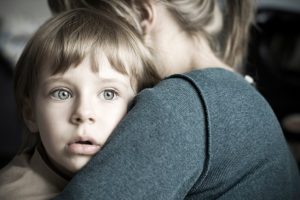
Recently several best-selling books as well as a number of child development experts have focused their attention on the growing trend of “helicopter parenting” and have described its negative effects on children and adolescents. These writers point out how parents’ tendencies to hover and overprotect their kids are destroying children’s initiative and making them feel incompetent and inadequate. The media is being blamed for this trend because it constantly bombards us with reminders of the calamities that could befall our children if left unsupervised for even a moment.
The point made by these writers is valid and resonates with many parents. It does seem that in trying to help our children avoid potential danger, we are over-scheduling their lives and depriving them of the kinds of experiences that we enjoyed when we were young. However, there are other powerful unconscious forces operating that are driving parents to restrict their children’s freedom of movement, ostensibly out of concern for their safety. Understanding these factors could be helpful.
In our work at the Glendon Association, a nonprofit psychological organization that provides parent education programs, we have come to recognize that many well-meaning parents overprotect their children, see them as less competent than they really are, and overstep their boundaries because they (the parents) feel connected to them through a process Dr. Robert Firestone calls the fantasy bond. In this imagined connection with their children, parents partly relieve their own fears of aloneness, separation, and death – the ultimate separation. In their minds, they feel merged with their children, while in reality, they may not be fully present in their interactions with them. These parents cherish the feeling of being needed by their kids, but actually they are not relating to them as unique, separate individuals.
The origins of the fantasy bond can be traced to infancy or early childhood. It arises to cope with interpersonal pain and separation anxiety and this imagined connection is reinforced when children learn about death. Even before they discover death, children use this fantasy of being merged with mother, along with primitive self-soothing behaviors, to partly relieve their pain and to avoid the possibility of being overwhelmed by the intensity of their reactions to separation experiences and other disturbing events.
The fantasy bond serves as a survival mechanism during childhood, but paradoxically becomes a barrier to one’s personal development as an adult. Later, as people mature, marry and have children of their own, they develop fantasy bonds with their children to varying degrees, and the cycle is continued into the next generation.
Parents who have formed a fantasy bond with their children also believe that children “belong” to their biological parents in the proprietary sense of the word. The imagined union with their child, in conjunction with this feeling of ownership, provides mothers and fathers with a false sense of safety, security, certainty and permanence. The Catch-22 is that in order to sustain this illusion of fusion in our everyday lives, we need to keep our children close by, dependent on us, and guilty about pursuing separate and independent lives of their own. On a conscious level and in the interests of being good and proper parents, we warn them about the world, envelop them in a cocoon of safety, and shape them to conform to our vision of what they should be as adults.
The fear of death figures prominently in this scenario of family life. In their book Beyond Death Anxiety, Dr. Robert Firestone and Joyce Catlett explain how many parents envision family continuity as a form of symbolic immortality — a kind of living on through their sons and daughters and their grandchildren in an endless chain of biological attachment. In one sense, our children do represent a symbolic victory over death by perpetuating our identity into the future. This notion is often referred to as gene survival. By transmitting our beliefs, attitudes, vocational skills, and wisdom to our offspring, we establish a sense of connection to the future.
Parents, again unconsciously, need to ensure that their children will perpetuate their (the parents’) specific way of life. They feel compelled to shape the child in their own image and to stamp in their own beliefs and ways of coping with the world. Clearly, this compulsion can lead to child-rearing practices that do not allow children to fulfill their own destiny or develop their own unique personalities. It turns out that despite their best intentions, many parents are interfering with their child’s developing into a competent adult capable of fulfilling his or her own goals in life.
In order to keep feelings of death anxiety at bay, parents must shape their children into the right kind of legacy. Our children can relieve our fears of death only if they adopt our political views, customs and beliefs. If they are too different from us, our anxieties about death and dying are intensified. For example, children who choose not to carry on the family business or who embrace a different political or sexual orientation not only erase the possibility of immortality for their parents, they also threaten the validity of their parents’ worldviews and beliefs, which have functioned as cultural and individual solutions to the death problem
The media does tend to inundate us with warnings about an increasingly dangerous world, however, it cannot be blamed for instigating helicopter parenting. The evening news and violent films act only as triggers for deep-seated fears that most of us try not to think about or suppress altogether. Yet these suppressed anxieties are strongly influencing how we relate to our children.
If as parents, we were to genuinely relate to our children, if we did not connect to them in our imaginations, but rather related to them as separate individuals, we would have to feel how precious they are to us and how precious we are to them. This real feeling interaction disrupts the fantasized connection with our children and increases our death anxiety. But when we do the opposite, when we hover over our children, although we are physically present, we are cut off from feeling their true vulnerability and love. Unfortunately, to protect ourselves from experiencing poignant feelings and fears of future loss, we become somewhat removed and can be emotionally distant from our children.
One solution to the problem of “helicopter parenting” is to educate parents about these tendencies, which are present in everyone. PsychAlive provides opportunities for parents to learn about themselves and their relationship with their children. As human beings, we all face a common fate. So it is understandable that we would try to protect ourselves, and our children, against the anxiety, dread, and sadness that surround an awareness of the inevitability of death.
Part of the answer also lies in acknowledging death as a reality instead of resorting to illusions of connection to our children. By becoming more vulnerable to our feelings of sadness about future losses, we can meet the challenge and embrace life more fully. We can recognize why we have been compelled to force our children into a certain mold so as to ensure a kind of sameness with us. Based on this new awareness, we can then make a concerted effort to not create carbon copies of ourselves, but instead allow our children to freely develop their own interests, goals, and priorities in life.

